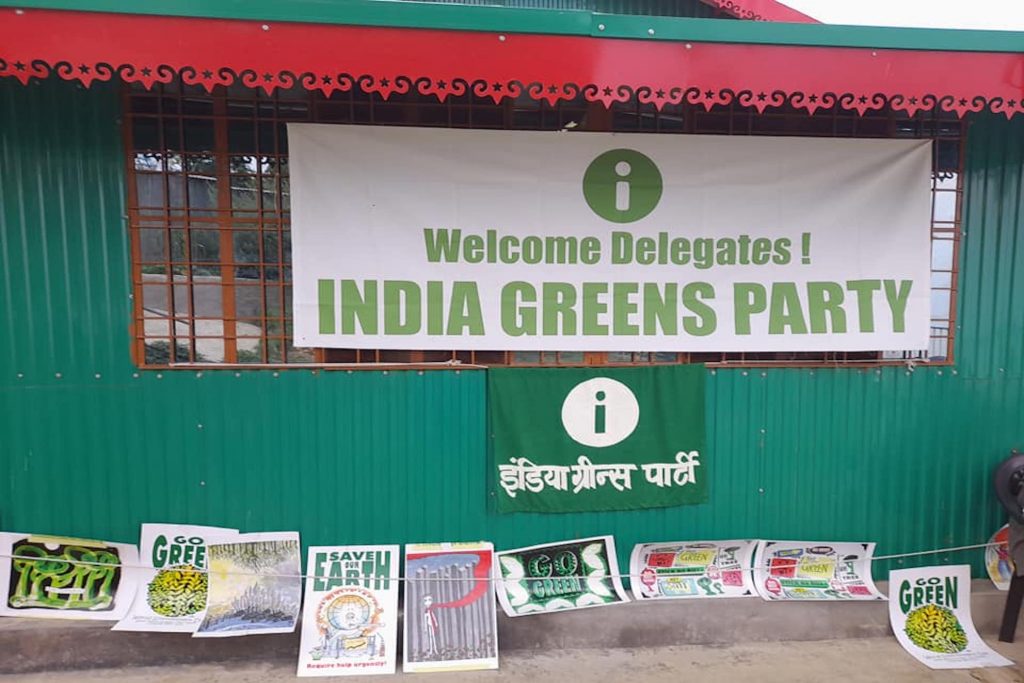The India Greens Party is struggling to make its presence felt ahead of UP Assembly elections due to lack of funds, candidates
The Assembly elections are around the corner in India’s political hotbed, Uttar Pradesh, but the founder of India’s first ‘green’ political party, Suresh Nautiyal, is a bit disappointed. Despite his keen desire to contest the upcoming elections in UP, Nautiyal’s India Greens Party (iGP) has been left wanting of ‘green’ hearts and funds.
The sexagenarian says, “The dust of communalism has heated up the atmosphere to an extent that people have no time to engage in a discourse on scarcity of potable water and shrinking agricultural fields; no wonder why anyone is not willing to listen to conversations on climate collapse and global warming. Who will listen to a political party not siding with any community on the lines of caste or creed?”
iGP, which was formally registered in 2019, is the only green political party from India with a national agenda which is part of the Global Greens—an international network of political parties and movements that work to implement the Global Greens Charter. This international charter is an agreement between political parties and other relevant organisations, who have pledged to come together to work on environmental and social causes on the basis of six guiding principles—ecological wisdom, social justice, participatory democracy, nonviolence, sustainability, and respect for diversity.
The party, which is headquartered in Uttarakhand, has footprints in 27 states and Union Territories, elected state units in three states, and ad-hoc committees/working groups in more than 10 States/Union Territories. The party has a gender balance at several levels and regularly conducts gender equity training sessions, apart from webinars, campaigns, regular meetings of the Executive Board (EB) and the Political Affairs Committee (PAC) to run the NHO and the organisation.
UP is not only significantly vulnerable to climate impacts, but is also home to five of the world’s top ten most-polluted cities as well. Sharing his plans for UP, Nautiyal said, “If UP is part of the climate problem of India, it can very well be a part of the climate solution as well. We understand the relevance of politics in mitigating climate impacts and that’s precisely why our politics is about issues like water, environment, ecological systems, agriculture, and everything that’s green.”
Owing to the largely agrarian nature of UP and the subsequent vulnerability of agriculture to climate change, iGP would specifically want to raise issues like farmers’ rights, remunerative MSP system, use of genetically modified organisms, social justice, education, health, sustainable living, etc.
But iGP somehow does not see a political space for itself in a state like Uttar Pradesh. Nautiyal says, “In the present hullabaloo over so many populist issues in the state, I doubt if anyone will listen to the sane green voices.”
Even if there were the audience for such green political voices, funding makes or breaks an idea in the space of politics. “India is a country where people do not donate their hard-earned money. They donate their black money, and a Green party cannot accept black money or any money coming from a dubious or unclean source,” he says. Nautiyal, a former journalist, does not believe in electoral bonds either as “they are not transparent”.
iGP has been surviving on the small amounts received as levies, membership fees, and donations from individuals. “People expect us to do wonders but can we do that without some funds?” he adds.
The party’s political activism is restricted to organising webinars and virtual meetings. “The party will resume old campaigns or start new campaigns and on-ground activities after the Covid-19 pandemic,” Nautiyal says.
Meanwhile, all the major political parties in the poll fray in UP, claim environment and climate issues are a priority.
BJP spokesperson Naveen Srivastava says, “All social welfare issues like climate change and environment have always been a political priority for us. It will, most likely, be stated in our poll manifesto as well.”
Akhilesh Pratap Singh, spokesperson of the Indian National Congress says, “It has always been a concern for us. In fact, Rajiv Gandhi was the first leader to have brought focus on the depleting ozone layer.”
Rashtriya Lok Dal (RLD), a party considered to be working for farmers’ rights, seems closest to the green cause. “Our political campaigns have been eco-friendly because we understand the irrelevance of politics if Mother Nature is dying. In fact, within the party as well, we promote green practices like promotion of eco-friendly consumables like cotton bags and earthen cups,” tells Anupam Mishra National Convener, Team RLD.
On a parting note, Nautiyal says, “We are into green politics not because of political ambition. We are here to pay back to Mother Earth. We are happy that we will be dying with less guilt.”


